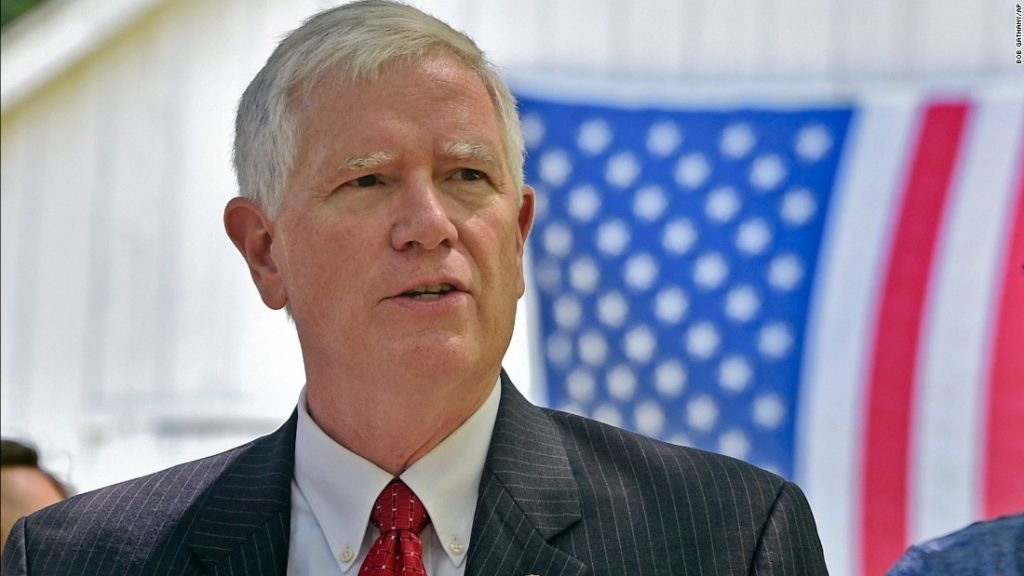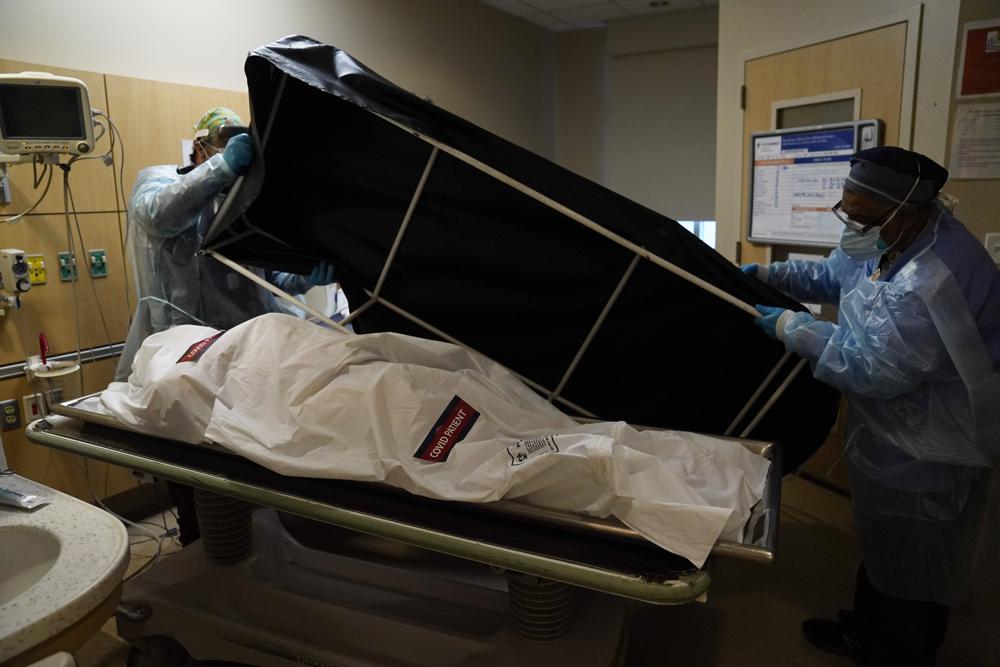Arrest warrant issued for Eric Swalwell team member Christian Seklecki for entering Mo Brooks’ home illegally

An arrest warrant was issued Tuesday for Christian Seklecki of Georgia for the Class A misdemeanor of 1st Degree Criminal Trespass. Seklecki was serving papers to Mo Brooks for a lawsuit from California Rep. Eric Swalwell. The lawsuit, filed in March, seeks to hold Brooks and others accountable for the January 6 Capitol insurrection. Seklecki entered Congressman Mo Brooks’ home illegally and accosted his wife, Martha Brooks, on June 6, 2021. On June 7, Congressman Brooks released a home surveillance video showing Seklecki stalking Martha Brooks and running into the home without Brooks’ knowledge or permission. Madison County District Attorney Rob Broussard confirmed the warrant was sworn out by Ms. Brooks reported WKRG. Martha Brooks stated, “On June 6th a process server illegally entered our home. I have worked with Huntsville City Police and the Madison County District Attorney’s office and sworn out a warrant for his arrest on the charge of 1st Degree Criminal Trespass. Mo and I take our security very seriously, as do all families. My hope is that my actions today will cause the process server to think twice before illegally invading the sanctity of someone else’s home, and put those who would threaten our security on notice that we will pursue illegal actions to the fullest extent of the law.” Congressman Brooks stated, “Congressman Eric Swalwell lied in his politically motivated, meritless lawsuit against President Donald Trump and me when he falsely claimed I incited the January 6th Capitol violence. Swalwell’s attorneys lied again when they strutted in front of the news media like peacocks in heat and falsely accused me of avoiding Swalwell’s lawsuit service when the fact is they could have served me roughly a hundred times before, during or after both Swalwell and I voted together on the House floor, or served me by U.S. Mail to my home address. In fact, when they finally got serious about serving me with the lawsuit, they served me not once, not twice, but three times, all within one week! So much for avoiding service or being difficult to find!” .@ericswalwell's team lied when they denied their teammate illegally trespassed into my home. Well, the home security video, Huntsville PD, the Madison County District Attorney’s office, a warrant magistrate and an arrest warrant all say differently. https://t.co/98ah1Sv9Rd — Mo Brooks (@RepMoBrooks) June 16, 2021 Brooks continued, “CNN and the Fake News Media compounded the Swalwell team lies by maliciously accepting Swalwell’s narrative without explaining that the law that puts the burden on the plaintiff to serve lawsuit papers (not the other way around), and without giving my printed rebuttals fair and balanced air time and article space. Swalwell’s team lied again when they denied their teammate illegally trespassed into my home. Well, the home security video, the Huntsville Police Department, the Madison County District Attorney’s office, a warrant magistrate and an arrest warrant all say differently.” On June 7, Swalwell’s attorney, Philip Andonian, told CNN, “No one entered or even attempted to enter the Brooks’ house. That allegation is completely untrue.” Now that the video has been released, Swalwell’s attorney maintains that the service was “lawful and valid.” Seklecki is an Atlanta native and isn’t expected to be extradited. The offense is classified as a Class A misdemeanor so he would be subject to arrest if he returned to Madison County, reported WKRG.
US COVID-19 deaths hit 600,000, equal to yearly cancer toll

The U.S. death toll from COVID-19 topped 600,000 on Tuesday, even as the vaccination drive has drastically brought down daily cases and fatalities and allowed the country to emerge from the gloom and look forward to summer. The number of lives lost, as recorded by Johns Hopkins University, is greater than the population of Baltimore or Milwaukee. It is about equal to the number of Americans who died of cancer in 2019. Worldwide, the COVID-19 death toll stands at about 3.8 million. The milestone came the same day that California and New York lifted most of their remaining restrictions, joining other states in opening the way, step by step, for what could be a fun and close to normal summer for many Americans. “Deep down, I want to rejoice,” said Rita Torres, a retired university administrator in Oakland, California. But she plans to take it slow: “Because it’s kind of like, is it too soon? Will we be sorry?” With the arrival of the vaccine in mid-December, COVID-19 deaths per day in the U.S. have plummeted to an average of around 340, from a high of over 3,400 in mid-January. Cases are running at about 14,000 a day on average, down from a quarter-million per day over the winter. The real death tolls in the U.S. and around the globe are thought to be significantly higher, with many cases overlooked or possibly concealed by some countries. President Joe Biden acknowledged the approaching milestone Monday during his visit to Europe, saying that while new cases and deaths are dropping dramatically in the U.S., “there’s still too many lives being lost,” and “now is not the time to let our guard down.” The most recent deaths are seen in some ways as especially tragic now that the vaccine has become available practically for the asking. More than 50% of Americans have had at least one dose of vaccine, while over 40% are fully vaccinated, according to the Centers for Disease Control and Prevention. But demand for shots in the U.S. has dropped off dramatically, leaving many places with a surplus of doses and casting doubt on whether the country will meet Biden’s target of having 70% of American adults at least partially vaccinated by July 4. The figure stands at just under 65%. As of a week ago, the U.S. was averaging about 1 million injections per day, down from a high of about 3.3 million a day on average in mid-April, according to the CDC. At nearly every turn in the outbreak, the virus has exploited and worsened inequalities in the United States. CDC figures, when adjusted for age and population, show that Black, Latino, and Native American people are two to three times more likely than whites to die of COVID-19. Also, an Associated Press analysis found that Latinos are dying at much younger ages than other groups. Hispanic people between 30 and 39 have died at five times the rate of white people in the same age group. Overall, Black and Hispanic Americans have less access to medical care and are in poorer health, with higher rates of conditions such as diabetes and high blood pressure. They are also more likely to have jobs deemed essential, less able to work from home, and more likely to live in crowded, multigenerational households. With the overall picture improving rapidly, California, the most populous state and the first to impose a coronavirus lockdown, dropped state rules on social distancing and limits on capacity at restaurants, bars, supermarkets, gyms, stadiums, and other places, ushering in what has been billed as its “Grand Reopening” just in time for summer. Disneyland is throwing open its gates to all tourists after allowing just California residents. Fans will be able to sit elbow-to-elbow and cheer without masks at Dodgers and Giants games. Gov. Gavin Newsom celebrated by hosting a drawing in which 10 people won $1.5 million each simply for being vaccinated. In New York, Gov. Andrew Cuomo said Tuesday that 70% of adults in the state have received at least one dose of the vaccine, and he announced that the immediate easing of many of the restrictions will be celebrated with fireworks. “What does 70% mean? It means that we can now return to life as we know it,” he said. He said the state is lifting rules that had limited the size of gatherings and required some types of businesses to follow cleaning protocols, take people’s temperature or screen them for COVID-19 symptoms. Businesses will no longer have to restrict how many people they can allow inside based on the 6-foot rule. For the time being, though, New Yorkers will have to keep wearing masks in schools, subways, and certain other places. Massachusetts on Tuesday officially lifted a state of emergency that had been in effect for 462 days, though many restrictions had already been eased, including mask requirements and limits on gatherings. Republican lawmakers in Kansas decided to let a state of emergency expire Tuesday. And Maryland’s governor announced that the emergency there will end on July 1, with the state no longer requiring any masks. The first known deaths from the virus in the U.S. were in early February 2020. It took four months to reach the first 100,000 dead. During the most lethal phase of the disaster, in the winter of 2020-21, it took just over a month to go from 300,000 to 400,000 deaths. With the crisis now easing, it took close to four months for the U.S. death toll to go from a half-million to 600,000. Republished with the permission of the Associated Press.
Hyundai halts Alabama production line amid parts shortage

A production line in Alabama that makes many of Hyundai’s North American vehicles will be halted this week due to a parts shortage. The shutdown will leave about 1,000 regular workers temporarily unemployed for seven days, The Montgomery Advertiser reported. The problem is that Hyundai Motor Manufacturing Alabama hasn’t been able to get enough parts because of a semiconductor shortage. As a result, production at the Montgomery plant will be suspended until June 21. “No other downtime for this reason is expected,” said Robert Burns, vice president of human resources and administration. The company “will continue to work with Hyundai Motor Group’s global purchasing team to allocate microchips to its U.S. manufacturing plant to optimize production in the coming weeks and months,” Burns said. About 3,000 people work at the Montgomery plant. Most of them will continue to work this week, the newspaper reported. That includes maintenance workers, employees processing completed vehicles, and engine shop employees building engines to be delivered to Kia’s plant in Georgia. The plant produces the Sonata and Elantra sedans as well as the Santa Fe and Tucson SUVs. It began rolling out the new Santa Cruz pickup earlier this month after finishing a $410 million expansion. The company will help workers file unemployment claims, Burns said. Republished with the permission of the Associated Press.
U.S. military guns lost, stolen from Alabama bases

Military weapons including pistols and submachine guns have been lost or stolen from bases in Alabama. An Associated Press investigation into firearms missing from the U.S. armed services shows at least 39 guns disappeared or were recovered in Alabama between 2010 and 2019. Most were associated with Anniston Army Depot, where a wall-to-wall inventory check of a Defense Logistics Agency warehouse revealed that 34 weapons were missing. The check began in January of 2016 and was completed that July. According to an investigative file from the Defense Criminal Investigative Service that AP obtained, the unaccounted-for weapons included seven MP5 submachine guns, and various types of pistols made by Colt, Sig Sauer, and Beretta. No suspects were identified and the case was closed in 2018. The weapons are among at least 1,900 U.S. military firearms that AP learned were unaccounted for during the last decade. Intended for war, some guns ended up on America’s streets. Army pistols, for example, were used in violent crimes including shootings and robbery. Military officials say missing firearms are a tiny fraction of their stockpile, and note that some are recovered. Republished with the permission of the Associated Press.
Steve Flowers: Prison issue unresolved

There were two major issues not resolved during the just-completed regular legislative session. Gambling and prisons were left on the table and up in the air. It is foolish to not address a resolution to get some revenues for the state from gambling which currently exists in Alabama. However, it is not imperative that the problem be solved. The prison problem is another question. It has to be addressed. The federal courts will take over Alabama’s prisons and tell the governor and legislature what to do to alleviate the crisis. The federal courts will win that fight every day of the week. They will act and give the legislature the bill for the expenses. It is happening now in California, and the same scenario happened in Alabama five decades ago during the George Wallace versus Frank Johnson era. Judge Johnson prevailed and told Alabama what to do with prisons and sent them the bill. The legislature, governor, and U.S. Justice Department agree that Alabama has to have three new prisons to alleviate unconstitutional overcrowding. The governor proposed privatizing leasing three new men’s prisons. Governor Kay Ivey and the Alabama Department of Corrections proposed a lease project as the solution to replace many of Alabama’s aging overcrowded and understaffed prisons. In February, Ivey signed a 30-year lease agreement for two of the three new prisons unilaterally, without legislative authority or input. The national firm, Core Civic, was chosen to receive the lease agreement and to build new prisons in Elmore and Escambia counties. However, the privatization plan has been thwarted by the Private Prison Firm’s inability to garner financing. In May, Bloomberg News reported that all three banks that were to finance the venture were backing out completely. The lease plan expired on June 1. Therefore, the route that legislative leaders prefer is that the state owns the prisons and pass a bond issue to pay for them. Legislative leaders, primarily and importantly Finance Committee Chairmen Steve Clouse of Ozark and Arthur Orr of Decatur, believe that there needs to be a Special Session called by Governor Ivey to address the building of three new men’s prisons and floating a bond issue to pay for them with the state owning the prisons. Representative Clouse has brought up another valid reason for there to be a Special Session regarding prisons. The state received guidelines in the waning hours of the session from the Treasury Department on using the four billion dollars Alabama is expected to receive for state and local governments under the American Rescue Plan passed by Congress. The legislature will be the appropriator of that money. It may well could be used by the state for prisons. Another factor that will be on the table are the locations of the prisons. A change from the lease plan to a prison bond issue would probably alter the locations to land already owned by the Department of Corrections. This land is available and was actually purchased adjacent to the current prisons at the time new prisons were last built over three decades ago during the last Wallace Administration. This land around the prisons was purchased for future expansions. During the planning, a blue-ribbon study commission was hired to determine the best locations for the prisons. The commission suggested that they should be near the metropolitan areas of the state. Wallace looked at the proposal and said that looks good, but I think we will probably put those prisons in Barbour County. Gov. Wallace’s home county was Barbour. The bottom line is that the prison lease plan proposed by the governor is dead. The other given is that new prisons have to be built to address a myriad of problems that have been outlined in the Justice Department suit. This issue has to be addressed. Therefore, it looks imminent that at least two Special Sessions are in store for this year – one on reapportionment of legislative and congressional districts and one on prisons. We lost our oldest past governor, Gov. John Patterson, on June 5. Gov. Patterson passed away at his ancestral home at age 99, surrounded by his family. Patterson was governor from 1959-1963. He defeated Gov. Wallace in the 1958 Governor’s Race, which featured a field of 14 candidates. Patterson was attorney general of Alabama prior to being elected governor. See you next week. Steve Flowers is Alabama’s leading political columnist. His column appears in over 60 Alabama Newspapers. Steve served 16 years in the state legislature. Steve may be reached at www.steveflowers.us.


